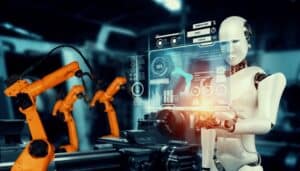
As AI gets smarter, manufacturing factories will become genius factories. They’ll use real-time information to make things even better and faster.
Imagine a world where machines could think, learn, and make decisions like humans. That’s the magic of Artificial Intelligence (AI), significantly impacting manufacturing. Don’t worry if AI sounds like a sci-fi concept – it’s already here, changing the manufacturing game uniquely.
Here’s a mind-blowing stat: experts predict that AI in the manufacturing market will grow to a whopping $16.3 billion by 2027, growing super-fast at an average rate of almost 47% between 2022 and 2027.
Guess what? Companies are super excited, too. A massive 93% believe AI is the secret ingredient to improving manufacturing, helping it grow and innovate like never before.
But let’s not get lost in numbers. In this post, we’ll take you on a journey to explore how AI is already working its magic in manufacturing. We’ll talk about intelligent machines that can predict problems before they even happen and robots that work hand in hand with humans to make things faster and smoother. So, buckle up and get ready to see how AI isn’t just changing the manufacturing game – it’s becoming the champion of change!
See also: Manufacturers Embrace Digital Twins for Enhanced Production
Use case of AI in manufacturing
In manufacturing, AI is like a helpful hand guiding the way. It’s changing how things are made by making them more intelligent and efficient. In this section, we’ll look at how AI is used in manufacturing to make things better and faster.
1. Predictive maintenance in manufacturing
Predictive maintenance is like a crystal ball for machines. Imagine if your car could tell you when it will break down so you could fix it before it leaves you stranded. That’s what predictive maintenance does for big machines in factories.
AI looks at the machine’s past behavior and listens to its “feelings” through sensors. It spots patterns that hint when something might go wrong. Just like how a doctor checks your heartbeat, AI checks the machine’s “heartbeat” to see if everything’s fine.
One excellent company doing this is GE Aviation, a subsidiary of General Electric (GE). They use AI to keep airplane engines healthy. AI guesses if they might get sick by watching how engines behave during flights. It helps airlines give the engines a checkup before they get sick and stop working.
Predictive maintenance and AI help keep machines fit and factories running smoothly, like a doctor keeping you healthy.
2. Quality control
Quality control in manufacturing ensures that products are made correctly and work well. It’s like checking to ensure a cake tastes delicious before serving it. Like an intelligent helper, AI is used to improve this checking process.
Take Tesla, a famous company that makes electric cars, for example. They use AI to help them make sure their cars are perfect. Just like a person might look closely at a car to find any problems, AI looks at the cars with cameras and sensors. If there’s a tiny mistake, AI notices it super quickly. This way, the cars that Tesla makes are outstanding and safe.
So, quality control with AI is like having a super helper that ensures everything is just right, just like when we double-check something to ensure it’s perfect.
3. Supply chain optimization
Supply chain optimization makes manufacturing smoother by organizing how materials are used and cutting down on expenses. AI looks at lots of information to guess how much stuff will be needed and figures out the best way to keep materials stored without wasting any.
Toyota, the car company, is an excellent example of this. They use AI agents in their “Toyota Production System” to monitor their machines’ performance. It can tell when something might break and helps fix it before it does. It keeps everything running and saves money. AI also helps Toyota know what cars people want to buy so they can make just enough without making too much. It helps them save money and be better at making cars people love.
4. Robotic process automation (RPA)
Robotic Process Automation (RPA) is like having helpful digital assistants in manufacturing. They handle repetitive jobs, such as entering data and managing supplies. It frees up humans to focus on more creative tasks. Artificial Intelligence (AI) adds an innovative touch to these digital helpers. They learn from patterns and can even make intelligent choices.
For instance, think of Bosch, a famous manufacturing company. They use RPA and AI to manage their supplies better. These virtual assistants handle tasks like processing orders and monitoring how much stuff is left. It helps Bosch work smoothly and stay competitive. It’s like having clever teammates that make work easier and faster.
5. Demand forecasting
Predicting how much stuff people will want to buy is essential in manufacturing. That’s where demand forecasting comes in. It’s like an intelligent guess about the future demand for products.
Imagine making toys – you’d want to make enough so you don’t run out, but not so many that they pile up unsold. Here, AI looks at past data, what people like now, and other worldwide events. It then makes predictions about how many toys to make.
Siemens AG from Germany is a manufacturing giant that makes things related to machines and energy. They use AI to guess how much people want from their industrial products, such as automation systems and energy equipment. It helps them plan better, ensure efficient resource allocation, maintain cost-effective inventory levels, and keep everyone happy – customers and the company alike!
6. Production line optimization
Product line optimization in manufacturing means making a bunch of similar things in the best possible way. AI looks at lots of information and finds smart ideas to improve things.
Take Airbus, a company that makes airplanes. They use AI to look at all sorts of airplane stuff – like what they’re made of, how they’re put together, and how many they need to make. AI helps Airbus figure out clever ways to use the same parts for different planes, making it easier and cheaper to build them.
It also helps them predict which planes will be famous so they can prepare to make more of them. So, AI helps make things, and companies like Airbus decide what to make and how to do it cleverly!
7. Inventory management
Inventory management is like keeping just the right amount of stuff in a factory so things run smoothly. It’s super important to ensure we have enough materials to make things and don’t end up with too much or too little.
Take Intel, for example. They use AI to be like an excellent fortune teller. It looks at past sales and figures out how much of their stuff people will want in the future. It helps Intel make the right amount of things, so they don’t waste money making too much or lose customers by not having enough.
Imagine having a brilliant helper that learns and gets better over time. So, AI makes Intel’s job easier, saves them money, and keeps their customers happy.
See also: You Can’t Spell Smart Manufacturing Without AI
The future of manufacturing with the advancement of AI
AI, the supercharged brainpower behind machines, is changing how we make things. Imagine factories that can predict when they will break and fix themselves before they do. Picture products are so perfect; they seem made of magic. This magic is a partnership between human smarts and AI’s number-crunching skills, reshaping how we create stuff.
But hold on. It is just the beginning. The future is going to be even wilder. As AI gets smarter, factories will become genius factories. They’ll use real-time information to make things even better and faster. And guess what? Robots will be our buddies, helping us out and keeping us safe. It’s like a superhero team-up but with humans and robots.
And that’s not all. Get ready for products that feel like they’re made just for you. Thanks to AI’s super senses, everything you buy will be tailored precisely to your desires. It’s like having a personal shopper who knows you better than anyone.
It is a significant change, like a revolution. AI isn’t just giving factories a boost; it’s giving them a whole new look. We’re about to enter a future where things are more remarkable, faster, and can change in the blink of an eye. This new era will bring us more fantastic stuff and make things easier for everyone. So, get ready for a wild ride because the future is almost here, and AI powers it.




























